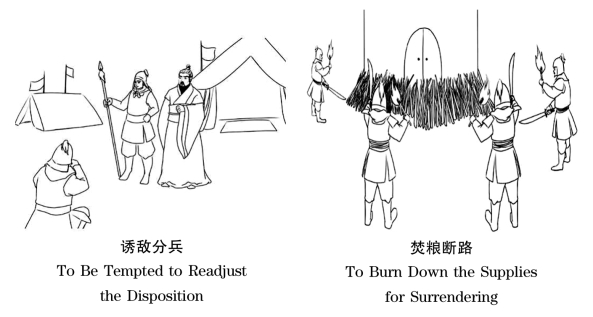《釜底抽薪》出处、故事、英文翻译、注释
18.釜①底抽薪②
fǔ dǐ chōu xīn
①釜:古代的一种锅。
②薪:(用来生火做饭的)柴草。
【出处】《三十六计》第十九计:不敌其力,而消其势,兑下乾上之象[1]。汉代董卓《上何进书》:“臣闻扬汤止沸,莫若去薪。”清代吴敬梓《儒林外史》第五回:“如今有个道理,是‘釜底抽薪’之法,只消央人去把告状的安抚住了,众人递个拦词便歇了。”
【成语故事】东汉末年,占据河北的袁绍发展很快,势力迅速崛起。公元199年,袁绍率领十万大军和曹操的三万多人隔着河对峙。袁绍仗着自己人马众多,决定派兵攻打曹操的领地白马。曹操表面上放弃了白马,假装命令军队主力向延津渡口转移,而且摆开了好像要渡河的架势。袁绍怕自己军队后方遭到敌人攻击,迅速率领主力往西前进,阻挡曹军渡河。谁知曹操突然派精锐回头,袭击袁绍驻白马的军队,轻松地取得胜利。在河流两岸对峙已久的两军,粮草的供给成了双方能否最终胜利的关键。于是,袁绍从河北调集了一万多车粮草,放在大本营以北四十里的乌巢。曹操打听到乌巢并没有重兵防守,决定偷袭乌巢,阻断敌人的粮食供应。当天,曹操亲自率领五千精兵,打着袁绍的旗号,趁着夜晚突然袭击乌巢。看守乌巢的袁军还不知道是怎么回事时,曹军已经包围了粮仓。曹军放了一把大火,烧光了粮食,并乘机消灭了守粮的袁军。袁绍知道消息后,一时没了主意,十分惊恐,使得军心浮动。就在这时,曹操向敌人发动全线进攻,丧失战斗力的袁军只能四处逃窜。袁军大败后,袁绍带领八百名士兵,艰难杀出重围,回到河北,从此便一蹶不振。
【寓意】该成语原意是指把在做饭时燃烧正旺的柴火从炉灶里抽出来,使得做饭的锅没有了热量,导致饭也做不成了。现喻指找到问题的症结所在,从根本上解决问题。也指在军事上斩断或者消灭敌人的关键所在,使其丧失战斗力。

釜底抽薪
To Cut the Ground from Under
18.To Cut the Ground from Under
【Idiomatic Story】 During the last years of the Eastern Han Dynasty,a warlord named YUAN Shao had controlled the area in He-bei — the northern part of China and had becoming more and more stronger in armed force.In 199 AD,YUAN Shao commanded a troop of 100,000 soldiers in mutual confrontation cross the river with CAO Cao who had only about 30,000 soldiers.Due to the majority in number,YUAN Shao decided to launch an attack on Bai-ma which was in the possession of CAO Cao.CAO Cao and his troops pretended to be scared into giving up Bai-ma and drew back to ferry of Yan-jin for crossing the river.YUAN Shao worried about the sneak-raid of his troops from the back,so he ordered the main force to march westward to stop CAO Cao and his troops from crossing the river.Unexpectedly,CAO Cao ordered his crack troops to hit back to Bai-ma and reoccupied Bai-ma easily.
With the long time of mutual confrontation cross the river,the supplies were the key factor to the final victory for both of them.YUAN Shao assembled large quantities of supplies and hoarded them in Wu-cao which was 40 miles north to the base camp of the main troops.When CAO Cao learned the news and found the troops stationed to guard the supplies was small,he decided to launch a sneak attack on Wu-cao.Before the stationed soldiers knew what happened,they were surrounded by CAO Cao's troops and their storehouses were caught on fire.The supplies had been burnt out and the guarding soldiers were killed or captured.When YUAN Shao got the news,he felt frightened and confused,and his troops were in low spirits because of worry.
CAO Cao took the good opportunity to launch a full attack on YUAN Shao and his troops.Under the strong attack,the soldiers of YUAN Shao's troops escaped in disorder.YUAN Shao himself fought his way out of a heavy encirclement with about 800 soldiers and returned to his own realm in He-bei.From then on,YUAN Shao had never recovered again.
【Implied Meaning】 It originally means to take away the burning firewood from kitchen stove in order to make the cooking lack of heating energy which leads to the impossibility of cooking.Now it is often used to refer to the very crux which can do much helping to solve the problems completely.It is also used to refer to the idea of making the enemy lose its battle effectiveness by destroying its key military installations or supplies.
【注释】
[1]兑下乾上之象:乾为天,兑为泽,即上天下泽,表示强弱显别,循规蹈矩,安分守己的平和景象。








